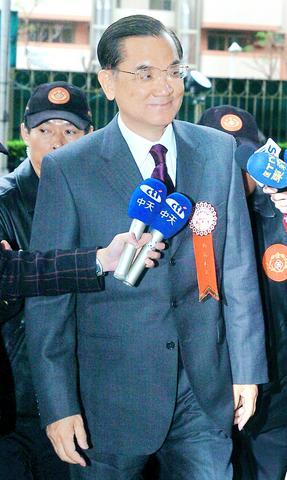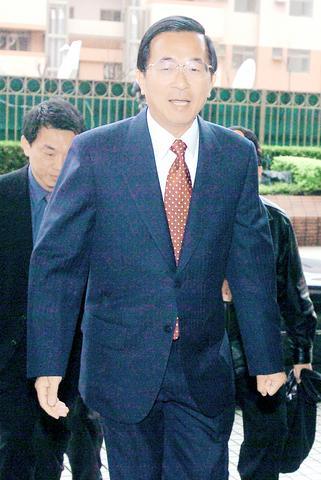The Democratic Progressive Party's (DPP) presidential candidate Chen Shui-bian (
"Mr. Lien's plan to end conscription is so simplistic it smacks of childishness, and will sacrifice Taiwan's security. His purpose is simply to cheat young voters," Chen said.

PHOTO: LIAO CHEN-HUI, TAIPEI TIMES
Lien retorted, however, that Chen's criticisms reflected a lack of understanding of military affairs consequent upon his not performing military service.

PHOTO: LIAO CHEN-HUI, TAIPEI TIMES
The two traded their accusations during yesterday's televised policy speech program, broadcast by China Television and hosted by the Central Election Commission. Each candidate had 30 minutes in which to outline his platform.
Chen first stressed that a fully professional military was something he had advocated throughout the past decade, but that it was a goal that needed to be achieved step by step, rather than in what he called an improvised manner.
"The former KMT government endeavored to hollow out the nation's financial base. Now its presidential candidate wishes to return to such strategies; he intends to hollow out the nation's defensive base," Chen said.
Chen said the creation of a fully professional military required three phases. First, he said, the best soldiers must be selected, and the number of troops reduced from 385,000 to 270,000.
In the second stage, there would be both enlisted and conscripted troops, in a 3:2 ration. Only in the third stage would conscription be completely abolished, he said.
"Military service is an obligation required by the Constitution. Any idea to change this therefore requires a Constitutional amendment, a process which takes years. It is not as simple as Mr. Lien's childish plan," Chen said.
To defend his promise to achieve military service reform by 2008, Lien further explained yesterday that after his victory in the March 20 presidential election, his administration would facilitate the passage of a bill creating a fully professional military service within one year and pass a special budget of NT$60 billion to put the policy into effect as quickly as possible.
"Since we must develop a defensive strategy with advanced technology and elite personnel, as well as allow our young generation to continue to contribute to society, we will require that all young men of draft age participate in a military training course lasting three months," Lien said.
According to Lien's plan, Taiwan's fully professional military would require 120,000 troops, 80,000 officers and NCOs and 50,000 graduates of military schools to make up a high-quality, defensive force.
"Mr. Chen says my plan is unrealistic. I can say that the reason he cannot accept it is because he lacks sufficient understanding of military affairs, especially because he never did military service," Lien said.
Chen was exempted from military service because of a malformed elbow as a result of falls in his childhood which prevents his arm from being stretched out fully. He did however do three months basic training in the reserves.
On a separate note, Lien then pledged that if he wins the election, he will donate all his earnings and campaign subsidies to underprivileged group, poor households and the unemployed.
Chen called on the public to take no notice of Lien's promise, because, he said, his donations would amount to less than the KMT was likely to waste implementing its campaign promises.
"A fully professional military service will cost hundreds of billions of dollars, while Lien's donations won't exceed a few hundred million," he said.

Auckland rang in 2026 with a downtown fireworks display launched from New Zealand’s tallest structure, Sky Tower, making it the first major city to greet the new year at a celebration dampened by rain, while crowds in Taipei braved the elements to watch Taipei 101’s display. South Pacific countries are the first to bid farewell to 2025. Clocks struck midnight in Auckland, with a population of 1.7 million, 18 hours before the famous ball was to drop in New York’s Times Square. The five-minute display involved 3,500 fireworks launched from the 240m Sky Tower. Smaller community events were canceled across New Zealand’s

The Ministry of Foreign Affairs (MOFA) yesterday said it is closely monitoring developments in Venezuela, and would continue to cooperate with democratic allies and work together for regional and global security, stability, and prosperity. The remarks came after the US on Saturday launched a series of airstrikes in Venezuela and kidnapped Venezuelan President Nicolas Maduro, who was later flown to New York along with his wife. The pair face US charges related to drug trafficking and alleged cooperation with gangs designated as terrorist organizations. Maduro has denied the allegations. The ministry said that it is closely monitoring the political and economic situation

‘SLICING METHOD’: In the event of a blockade, the China Coast Guard would intercept Taiwanese ships while its navy would seek to deter foreign intervention China’s military drills around Taiwan this week signaled potential strategies to cut the nation off from energy supplies and foreign military assistance, a US think tank report said. The Chinese People’s Liberation Army (PLA) conducted what it called “Justice Mission 2025” exercises from Monday to Tuesday in five maritime zones and airspace around Taiwan, calling them a warning to “Taiwanese independence” forces. In a report released on Wednesday, the Institute for the Study of War said the exercises effectively simulated blocking shipping routes to major port cities, including Kaohsiung, Keelung and Hualien. Taiwan would be highly vulnerable under such a blockade, because it

UNRELENTING: China attempted cyberattacks on Taiwan’s critical infrastructure 2.63 million times per day last year, up from 1.23 million in 2023, the NSB said China’s cyberarmy has long engaged in cyberattacks against Taiwan’s critical infrastructure, employing diverse and evolving tactics, the National Security Bureau (NSB) said yesterday, adding that cyberattacks on critical energy infrastructure last year increased 10-fold compared with the previous year. The NSB yesterday released a report titled Analysis on China’s Cyber Threats to Taiwan’s Critical Infrastructure in 2025, outlining the number of cyberattacks, major tactics and hacker groups. Taiwan’s national intelligence community identified a large number of cybersecurity incidents last year, the bureau said in a statement. China’s cyberarmy last year launched an average of 2.63 million intrusion attempts per day targeting Taiwan’s critical